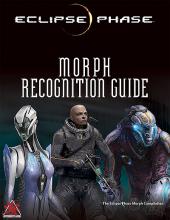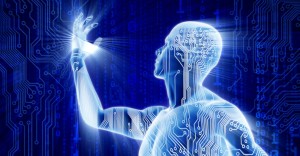The term is getting thrown around a lot these days and when I write the words a lot I mean a lot. Transhumanist groups all over the world have seen their numbers swell over the last five years, an example being the Singularity Group, a Transhumanist group that went from 400 members in 2011 to over ten thousand by 2014. The idea of “beyond human” has found itself coloring the cultural landscape in music, movies, television, novels, and especially in gaming. At first these change were small bits and pieces of what is an all-encompassing philosophical movement. Then Posthuman Studios in 2009 dropped Eclipse Phase on our collective gaming culture like a unknown hip-hop artist dropping the mic after proving themselves in an epic rap battle. The team at Posthuman integrated and deftly arranged Transhuman philosophy into and around every element of EP and created a game that is in the same vein as Shadowrun, forcing deeper thinking about the gaming experience from both a mechanical and setting perspective. Now in the uncertain future, which all gaming companies get to enjoy, in an industry that much like amateur theater is more a matter of passion than profit, the question becomes what is the direction of EP as the Transhumanist movement itself slowly saturates and bloats beyond the bounds of philosophy and into the realm of faith and cult-like attraction?

Let’s take it back to basics; what is philosophy? What is a philosophy? Why is Transhuman philosophy, at least initially, the truest descendant of those original Grecian deep thinkers? Start with the word: philosophy, the study of the fundamental nature of knowledge, reality, and existence, especially when considered as an academic discipline. The word itself is made of two; philo, “to love”, and sophos, “knowledge”. The first word, philo, has layers of meaning, being of the same literary family tree as phyle, “a race or tribe”, phyein,”to bring forth, produce, or grow”, and physis, “nature”. What is the Transhumanist movement but a collection of “tribes” all trying to “grow” more powerful so as to control “nature”? More so than any philosophy in history Transhumanism fulfills the faceted meanings of philo. Being a member of the movement doesn’t bring riches; followers love the promise of the movement. A golden apple of, if not immortality, then extended lifespan and health that no human being has ever enjoyed and expansion of the mind to match. Of course minus the necessary transition of death required by many other golden apple offering organizations who will remain nameless. I’m sure we can all think of a few off the top our collective heads, hm? Or wait, maybe there is a shuffling the mortal coil price of admission? We’ll get to that later.
Sophos, knowledge, in Ancient Greece men who so debated and argued over the meaning of life and everything were referred to as sophists; teachers who used rhetoric and philosophy to teach arete, excellence, to paying noble students. If the previous sentence sounds like a set-up for a winding downward path of corruption and misunderstanding than you’re paying attention. A modern day sophist is considered a charlatan, a hack, a cunning master of words who uses clever but ultimately fallacious and deceptive arguments. Yes, that’s right, a con man fleecing retirees in Florida has as much in common with a sophist of ancient Greece as the modern philosophy teacher. They are two sides to the same coin. Did I mention ancient Grecian sophists were also the first lawyers? Thanks, Greece.
It is in this respect that I feel Transhumanism cements a place as the truest spiritual successor to ancient Grecian philosophy. The Transhumanist movement offers a bright shining future filled with reason, logic, intellectual pursuits, and wonderful advanced technology. It also offers existential threats to both the continued prosperity of the our species and our very sense of self-preservation. Both of these futures are painted in golden words and clever arguments. One is classic sophist and the other modern and the movement has started to mix the two arguments freely.
“Wait,” you said while finishing that last sentence because you think I can hear you through the magic of the internets, “isn’t this a gaming website?”. You are correct! Eclipse Phase brings this murky complexity into the table-top arena and through the games we play and the campaigns we run forces us to face the questions of Transhumanist and Posthumanist thinking while laying the groundwork in the very bedrock of the mechanical dice system. Posthuman studios has created a game that from page one of character creation gently reaches under our chairs and elevates the conversations at our gaming tables.

There are effectively two characters being created. The hardware; the body: whether bone and blood or steel and circuits; and the software: the mind, skills, and memories of the player character. The software is, in contrast to our experiences with computers, the permanent element of your character, while the hardware, in true Transhumanist fashion, is disposable and replaceable and upgradable like that cherry keurig in your kitchen. You can get a bedeviling assortment of enhancements both biological and mechanical for your body but never forget that you’re only stuck in it until you finish the payments… though, get the Gap insurance just to be safe. This is a pure idealist view of a bedrock technology for a Transhuman future that borders on posthuman. The idea of the mind and body as something that can be uncoupled is perhaps the easiest to understand concept at the center of Transhuman thought, and more importantly, is one of several fulcrums for playing Eclipse Phase. The body is a housing and with proper technologies for uploading, recording, and processing human personalities it may be abandoned.

As a player this will be one of the most difficult things to accept on a deep instinctual level as ironically the ideas of libertarian politics and individual liberties can be quirky and the popularity contest of a post-scarcity economy; which isn’t actually in Eclipse Phase; can be complicated, they are rooted in ideologies we can interact with in the real world. However, to abandon your body and not feel a deep loss when being uploaded away is an instinctually difficult idea to grok. FYI; “grok” is loaded into all spell checkers; that’s a big “W” for Heinlein. There isn’t anyone who can predict with any accuracy what would happen to a mind without all the support biology of a million years of evolution connected to it. Remember above about golden apples and transitions of death? When a computer moves a program it copies it first then deletes the original. Two whole and complete instances of self would exist and for those few moments be the absolute same person having the same experience. The entire experience would be so far outside our own reference points as to do unknown damage to the psyche. Thankfully Posthuman Studios agrees and included insanity and Stress points as an alternative type of damage and health in addition to the usual physical indicators of health.
The idea of sanity and more specifically the relation between perception and reality is another core tenet of EP and an important “big question” part of Transhuman thought. The world of EP has folded what a modern perspective would call virtual into the the physical world. The idea of technology so closely integrated as to be genetic means the street of virtual advertising that you can’t without the proper implants becomes reality. A city block, gray and tan buildings four to five stories tall, the thin skies of Mars overhead. There are crowds of people all moving along chatting but there’s no noise other than feet and mouths. However, with the proper implants, the street is lit with a dizzying array of animated signs for business. Holographic greeters stand outside door ways offering sense memories to sample products and digital menus with encrypted coupons to take home and order with later. The ears are alive with soundtracks being offered like radio a number of HD channels from private casters to a particular storefront offering a soundtrack with their commercials subliminally layered underneath. The clothes of the people are alive with neon art, short animations advertising a new popular band or movie.
Should you want more information about that popular band or movie the image itself acts as a hyperlink to the movie’s launch site or the band’s fan page illuminating the integrated instant access to information. We in the modern day have some understanding of what it’s like to always be plugged in, connected to a vast resource of information. However, the tenets of Transhumanist thought call for a deeper integration of this access. An almost subconscious access, your implants; a solid state hard drive, networked cellular sized processors operating inside a shell made of your cloned neural cells, a multi-band high speed wireless connection made of micro-line that grows along your cardiovascular system. Imagine your virtual half offering up information and data without prompting as you take in the sights. Even downloading small sense memories, another person’s actual memory of doing something or experiencing something that they’ve digitized into a small file to be added to your own sense memory. As you integrate other memories then the questions arises of identity. What is identity in the face of the moldable nature of mind and awareness?
What is the value of self in the face of neural uploading? The first time the mind is uploaded, assuming from a healthy human, there are then two of that person existing, staring at each other through their perception of the world and both wholly formed people. The two would be identical people for only the briefest of moments and then they will be ever so slightly different. The in-setting laws and sections in EP about that moment is one of the most complicated sections of the entire line of books and is one of the most complicated ideas of Transhumanist thought. The process of “forking” involves rolls to prune the neural structure of your characters duplicate and allows a purpose built version of self minus any distractions like sense of self or memories in the case of beta forks. The much more complicated; re: fully realized duplicate; alpha fork is the more legally, philosophically, ethically, and spiritually dangerous concept.

This is where Transhumans falter in the philosophy and EP expresses it beautifully as few if any can agree on the moral and ethical nature of the above situation. Is it suicide to transfer your consciousness, to upload a copy of self away from your birth body? Is it a murder/suicide pact between your self when a fork is sent to collect information returns and is reintegrated into the “original” or does the fork demand the “original” integrate into the fork? Which is the legal entity known as that person? Who has legal precedent and who is the true person? EP handles this by providing every major answer in the characters of every major power in the solar system setting of the game. The Jovian Republic says there is a soul and if you’ve left your original body you are not human anymore. The Scum Fleets encourage experimentation of self that sound more like a John Carpenter movie than the well reasoned choices of an advanced species. The Martians focus on survival and let others tackle the big questions. The Titanians actively explore the concept in academic settings while Extropians enjoy the full width and breadth of the technological advances but don’t clamour for the extreme experience the Scum pursue. There are more and more and more factions, clades, tribes, clans, hypercorps, small city-states (village-states?), and ever more exotics forms of community. Like flipping through the pages of a book they are each different in their approach and reaction to the neural freedom of technology.
What does this do to the psyche? The far reaches of Transhuman technology create monstrous abominations that chant “long live the new flesh” while charging to break the body while their very appearance breaks the mind. A mind already ablaze and saturated with this constant input of sights and sounds that must be actively managed. A mind that isn’t tethered to a body and may also roam fully into the digital world of restaurant menus and subliminal advertising. How does this affect an originally “normal” human mind? The Stress point and insanities system of Eclipse Phase reflect the downside of this morphic freedom and by reflecting the darker side of the malleability of mind they embrace all of Transhuman thought. The rolls for resleeving, the adjustment periods, and all the bonuses and flaws of switching bodies is a fundamental element of Eclipse Phase and this neural freedom is key element of Transhuman thought.
The idea of a “mind” as software creates interactions with the environment not possible in other games and dangers that simply can’t be found outside of EP. The mind can be transferred to newer and/or better bodies but is also a target for psychological invasive memes, malware consisting a bad case of schizophrenia where the voices give you specific instructions to leave the back door unlocked at the bank, even whole other personalities with separate skills ready to take over when needed most. In this element of EP the Transhuman thinking at it’s core shines very brightly indeed. You must have faith in the process upon which you embark because after it’s done your mind will be humanely wiped from the meat like quietly putting down a old dog.
Transhuman thought asks massive questions about the mind and Eclipse Phase brings all those questions and the underlying technologies to you as a player in a variety of combinations. Just like the neural and morphic freedom that Transhumanity strives for the world of EP offers a way to play and approach these massive questions from any angle. Is the mind the soul? Do we have a separate element of ourselves which make us that can’t be transferred? Is there really a difference between real and virtual? Can a human be duplicated and if so are both the original? Can a mind be programmed, firewalled, infected with a virus, and upgraded like a desktop computer? Is there a point where the you that exists isn’t the same that existed?
Those are big table breaking questions and they won’t be answered in this article or in the Eclipse Phase setting so…good luck with that? The next time we meet we’ll dive into morphological freedom, the technologies and philosophical concepts behind re-sleeving, morphs, biotech, nano-tech, and the point where artificial and natural becomes very blurred indeed. We’re going to be with Eclipse Phase for a while really exploring the ins and outs of the Transhuman heart that beats at the center.
